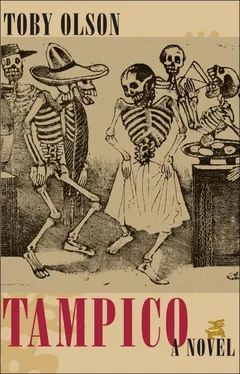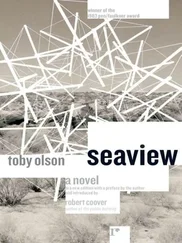She was an old woman, and she wore a woven dress composed of those small rectangles of color he’d seen in Alma’s shirt the day they’d started their journey. The dress hung from her shoulders, unbelted like a poncho, its hem above her knees, and her legs below the dress were thick, ropes of smooth muscle ending at thin ankles, her feet in leather sandals. Her hair was grey and oiled and pulled back tight at her temples and tied behind in a kind of braided bun that showed itself, a silver knot where her spine started, as she turned her head slightly and glanced at the company at Carlos’s table. He could see her face clearly, the broad brow and small hooked nose, those slabs of flesh that were her cheeks, stonelike and expressionless, and above them her black eyes. They were bright in the candlelight, though he could see no pupils.
“Chepa.” Just the one word, softly, coming from Gino, so softly that Ramona looked back at him quizzically as if he’d cleared his throat or tracheotomy tube oddly, only that, but Carlos heard it, something rising from a story, among those shards that were still in him, buried deeply in remembered delirium, that bed in the solarium at the Manor and someone touching him, and his father too in the stories, in a dream. He heard a creak and knew it was the wheelchair turning and that John had heard the spoken name as well.
Then she was moving. She said something. She was not feeble, but she moved carefully, slightly hesitant, but not pausing. She was crossing the space between the edge of darkness and John’s chair, and Carlos looked to the chair and saw a spark fly up and tumble in the air as he flicked his cigarette away. Then his hands rose and reached out, palms open, and she was moving without thought for moving, a faint smile on her lips, her eyes still bright and enigmatic above it, and when she reached John’s legs she touched them, searching for his bony knees below the blanket that covered them, leaning over his lap, her face only inches from his. Then she was climbing into the chair with him, careful not to hurt him, sliding her legs over his legs, her knees moving up toward her stomach, and Carlos saw her fingers touch the nape of his neck, pulling his head down to her face, and saw John’s fingers as he raised them to his brim and took his hat off and threw it into the darkness. Then her cheek was against his, her mouth at his ear, and she was whispering words meant only for him, and Carlos saw John’s head move as he answered her, his thin silver hair, saw moments of hesitation and stiffening in the arms that held her, and in a while he saw her hand working at the buttons of his rough, woven shirt, her fingers slipping in between the folds of multicolored fabric to touch the flesh at his stomach.
Frank had awakened from his reverie, and he too now turned in his chair to watch them, his back to the table. Larry sat only a few feet away from them, awkward there, and Carlos saw him turn and cross his legs, then look off to fix his gaze on those seated in the line of chairs, moonlight in the beads of his skullcap.
“My, oh my.” It was Gino once again, and Carlos saw his father’s face and the recognition in it when he looked at him across the table.
They sat there, all of them, for a long time, trying not to watch John and Chepa. It was hard to do, as in their slow turnings in the chair and their whisperings they were much like lovers in some private bed. It was Gino who disengaged them when he reached over and took Ramona’s hand. She still held Manuel in her arms, but she surrendered to her father’s touch, and Carlos saw her finger move along the dark tissue at his wrist. Then Larry stood and stretched himself and touched his lips with his fingers, then placed his hand over his heart. He was looking beyond the couple in the wheelchair, out into the darkness where the men sat, and though he gave no other sign that Carlos recognized, the two men rose beside the women as if at his beckoning, and Larry started toward them. They were smiling as they came into the light, and when Larry reached them, the blond one touched him lightly on the arm, then on the shoulder, and the three of them moved off, passing the women and the chairs and heading into darkness toward the buildings at the square’s side.
Then Gino was rising, and Ramona too, releasing her husband to go with her father, hand in hand, to the far side of the fountain, where they sat at the broad stone edge, their heads close together. Frank remained seated, his back to the table now, hands folded in his lap, dreaming again, or looking off vacantly into the darkness. Then Alma rose and moved around the table and headed for the wheelchair, and Carlos heard a quiet yipping, and when he looked to the fountain’s broad edge he saw a chihuahua standing there, squat and very still, as if a sculpture, her yellow body turned to terra-cotta in torchlight. Then he heard the squeak of the wheelchair, and when he turned he saw it moving from behind the table, Alma pushing it, the two figures folded into one as they passed him and headed beyond the guttering candles on the serving table and into the moonlight that guided their way toward the square’s end.
He could see the glass house clearly in the distance now, the strict, geometric lines of its metal skeleton, its veranda awash in light, a shine of silver, much like that seen on shore, phosphorescent in the full moon, and then he heard his father cough, and when he glanced at him, he saw his dark, watery eyes, then looked beyond him to the fountain’s edge and saw the dying torch and that the chihuahua that had stood there, so silently, was gone. He could see Ramona and Gino, sitting close together at the fountain’s other side, and when he brought his eyes back to his father’s face, he saw that he was weeping quietly as he fumbled with his pipe. Then he looked beyond him and found them again.
They were moving down the square’s center, Alma leaning forward at the chair’s handles in the effort of pushing them. And the dog went before them, prancing and leaning ahead too, as if she were tethered to the chair and was pulling it, dragging a weight as heavy as all Mexico behind her, though really quite easily, given her strength and resolve.
His father sat at the table across from him, stuffing his stone pipe carefully with tobacco, and when he was finished and looked up at him he was no longer weeping, though his eyes glistened in the recognition that passed between them. Carlos lifted his own pipe, urged to a taste for it by his father’s actions. Between them, facing away from the table, Frank sat with his head in his hands, his elbows on his knees, an image of exhaustion in surfeit or the despair of the empty observer left only with the vision of what has passed.
Carlos looked at his father, then beyond him to the now vacant square. Then his father lit his pipe, flame rising up at the bowl, and he lit his, and they both smoked in the moonlight, their hands on the white cloth among the guttered candles and the leavings of their fine dinner, while the oldest generation took part in the pleasure of each other, off in the distance in their private world.
Iguess it’s left to me to straighten out the story, though I was absent for most of it, wandering through the tilted rooms of my house and watching the lights blink at the barricades when there was no illuminating moon and a secret approach might be possible. I’d gotten rid of everything important, and I’d been going through memories of my mother and father and my times with them, in order to put the past behind me and to know for sure I couldn’t find the cause of my malady there, even though I knew ahead of time I wouldn’t. It was just something to do, as were the treadmill and the weapons placed at the windows and my changing into what I called my battle garments, just an old pair of Levi’s and my father’s warm hunting jacket, made with pockets and fabric loops for holding shells, comfortable against the night’s chill and the rain that leaked in through the roof to form puddles on the carpets and floors when it missed the pots I’d put out to catch it. The house was torquing and twisting, the hardwood lifted to waves in the kitchen and hallway, and though I looked out the same windows for the framed views I had in mind, I kept seeing something else.
Читать дальше












